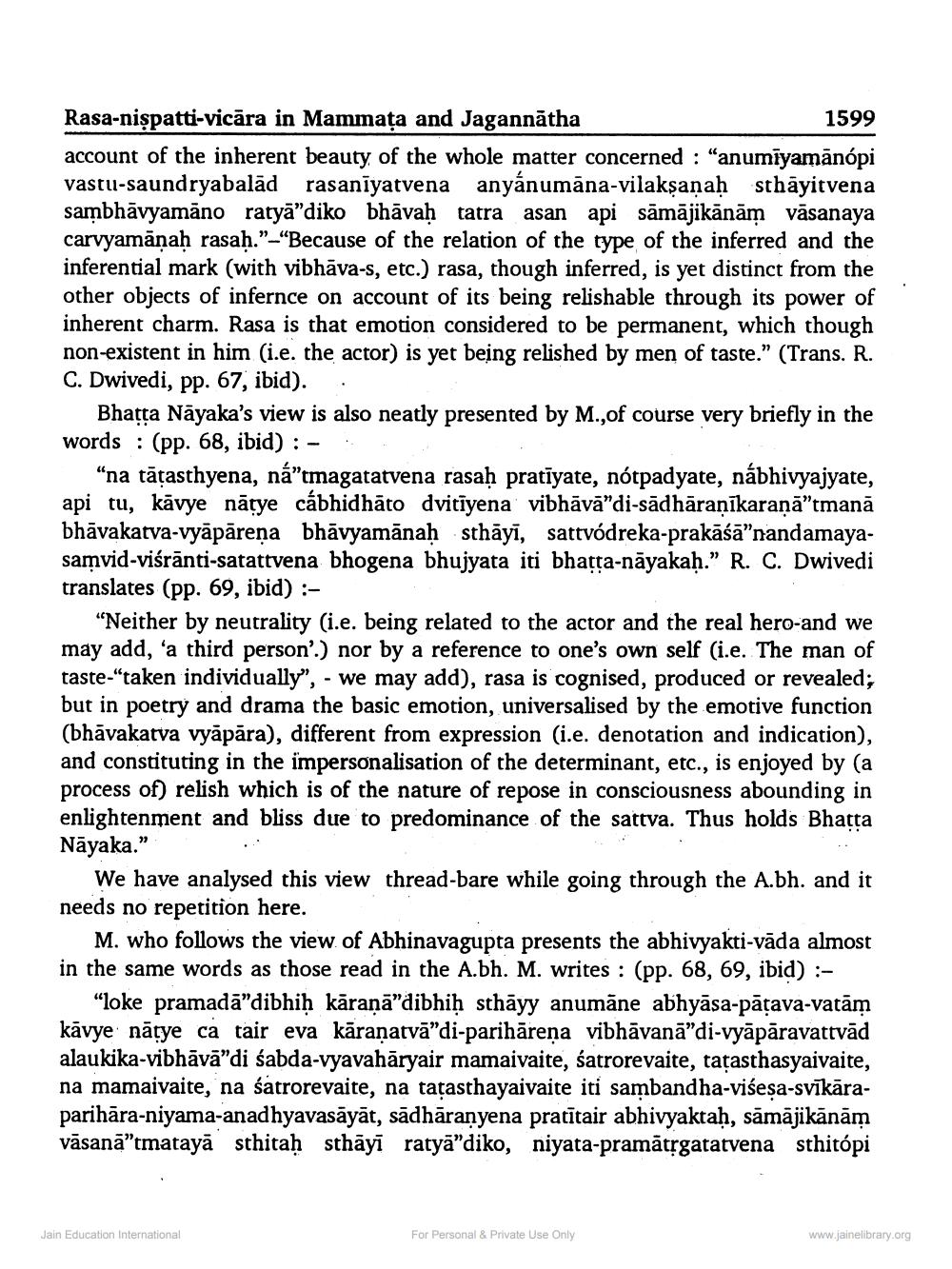________________
Rasa-nişpatti-vicāra in Mammața and Jagannātha
1599 account of the inherent beauty of the whole matter concerned : "anumīyamānópi vastu-saundryabalad rasaniyatvena anyánumāna-vilaksanah sthāyitvena sambhāvyamāno ratyā"diko bhāvaḥ tatra asan api sāmājikānām vāsanaya carvyamāṇah rasaḥ.”-“Because of the relation of the type of the inferred and the inferential mark (with vibhāva-s, etc.) rasa, though inferred, is yet distinct from the other objects of infernce on account of its being relishable through its power of inherent charm. Rasa is that emotion considered to be permanent, which though non-existent in him (i.e. the actor) is yet being relished by men of taste." (Trans. R. C. Dwivedi, pp. 67, ibid). .
Bhatça Nāyaka's view is also neatly presented by M.,of course very briefly in the words : (pp. 68, ibid) :
“na tāțasthyena, ná”tmagatatvena rasaḥ pratīyate, nótpadyate, nábhivyajyate, api tu, kāvyenātye cábhidhāto dvitiyena vibhāvā"di-sādhāranīkaranā"tmanā bhāvakarva-vyāpāreņa bhāvyamānah sthāyī, sattvódreka-prakāśā"nandamayasamvid-viśrānti-satattvena bhogena bhujyata iti bharța-nāyakaḥ.” R. C. Dwivedi translates (pp. 69, ibid) :
"Neither by neutrality (i.e. being related to the actor and the real hero-and we may add, 'a third person'.) nor by a reference to one's own self (i.e. The man of taste-"taken individually", - we may add), rasa is cognised, produced or revealed; but in poetry and drama the basic emotion, universalised by the emotive function (bhāvakarva vyāpāra), different from expression (i.e. denotation and indication), and constituting in the impersonalisation of the determinant, etc., is enjoyed by (a process of) relish which is of the nature of repose in consciousness abounding in enlightenment and bliss due to predominance of the sattva. Thus holds Bhatta Nāyaka.”
We have analysed this view thread-bare while going through the A.bh. and it needs no repetition here.
M. who follows the view of Abhinavagupta presents the abhivyakti-vāda almost in the same words as those read in the A.bh. M. writes : (pp. 68, 69, ibid) :
"loke pramadā"dibhiḥ kāraṇā”dibhiḥ sthāyy anumāne abhyāsa-pāțava-vatām kāvye nātye ca tair eva kāranatvā"di-parihārena vibhāvanā"di-vyāpāravattvād alaukika-vibhāvā"di sabda-vyavahāryair mamaivaite, śatrorevaite, taţasthasyaivaite, na mamaivaite, na śatrorevaite, na tatasthayaivaite iti sambandha-višeşa-svīkāraparihāra-niyama-anadhyavasāyāt, sadhāranyena pratītair abhivyaktah, sāmājikānām vāsanā”tmatayā sthitaḥ sthāyī ratyā”diko, niyata-pramātņgatatvena sthitópi
Jain Education International
For Personal & Private Use Only
www.jainelibrary.org




